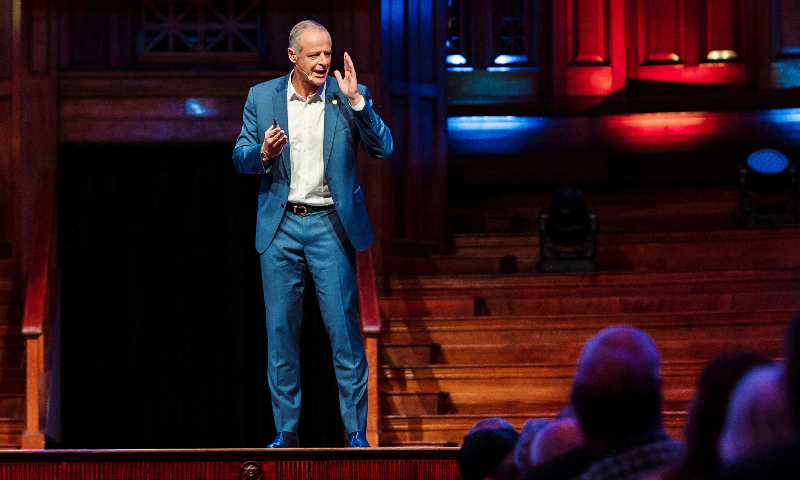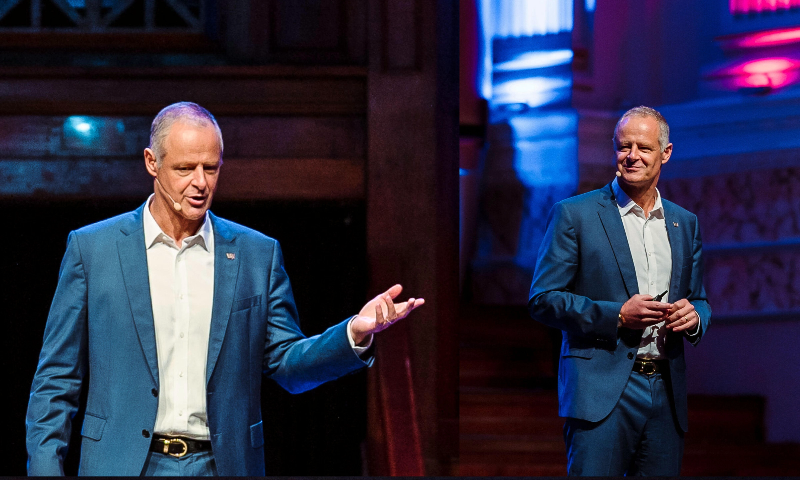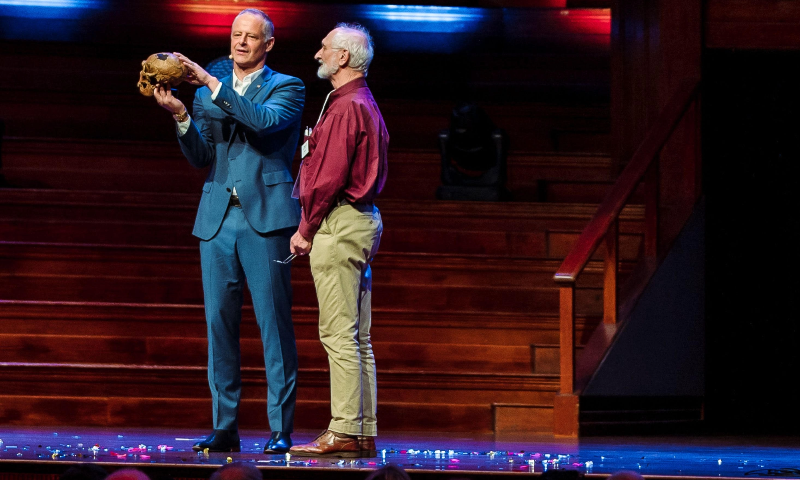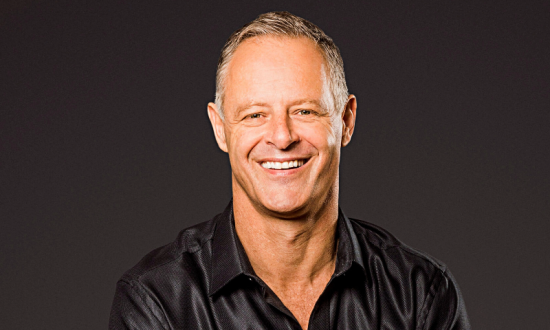John Hale – The Strategy Guy is a highly accomplished motivational speaker, strategic advisor and executive coach, with an impressive track record spanning three decades. He has left an indelible mark on some of the world’s most recognised global firms, as well as advising all levels of government.
Beyond the global stages, boardrooms and consulting rooms, with five degrees among his credentials, John has worked as a Visiting Professor, teaching in five business schools, including Singapore University, Bond University and Melbourne Business School. He is a father of four and the author of three popular books on strategy and leadership.
Recently, in an exclusive interview with CXO Magazine, John shared his career trajectory, the most fascinating aspect he finds about being a motivational speaker, the key ingredients required to become successful, personal sources of inspiration, future plans, pearls of wisdom, and much more. The following excerpts are taken from the interview.
John, could you brief us about your background and areas of interest? What made you want to become a motivational speaker?
In many ways, life kept nudging me to become a motivational speaker.
Speaking is also in my genes! One of my grandfathers was a CEO, and the other was a Baptist Minister. Both were storytellers before motivational speaking became a profession. My late mother was a poet, playwright, English teacher and musical performer. She revealed to me my precious connection to the natural world and how to align right understanding with right action. My father was a Mathematics teacher and computer scientist who worked at Stanford. He instilled in me the satisfaction that comes from solving problems and teaching others to do the same.
As Head Boy at school, Sports Association President in college and student representative at business school, someone was always handing me a microphone and pushing me on stage. After college, I spent four years working in technology sales for Hewlett Packard and IBM. Then for seven years, I taught and coached aspiring athletes to excel.
Building rapport is something I excel at, so motivating people to buy, learn and perform was not difficult. When motivational speaking became an option, I seized it. Looking back, twenty-five years ago, an intuitive friend predicted that my speaking journey would one day place me in arenas and stadiums. They were right.
You have educated 20,000+ leaders in 20+ industries with conference keynotes and workshops, facilitated 200+ strategies, mediations, advised policymakers and consulted communities and transformed 50+ cultures, coached 200+ executives and led projects + change programs. What do you find the most fascinating about being a motivational speaker?
There are many fascinating aspects. Each gig is unique – even if the topic, takeaways, stories and audience members don’t change. It was Heraclitus who said, “No person ever steps into the same river twice, for it’s not the same river, and they are not the same person.”
With some audiences, there can be a heckler who will shout out an objection and want to challenge what is being said. What I find fascinating is that when I notice that heckler in a future audience, they are on board, often having explored one or more of my books and even brought their mother-in-law, spouse or trusted advisor along with them!
I’ve explored this. At least two things are at work here. One has to do with truth, and the other with connection. German philosopher Arthur Schopenhauer noticed that “All truth passes through three stages: First, it is ridiculed. Second, it is violently opposed. Third, it is accepted as self-evident.” Unlike an entertainer or inspirational speaker who shares stories and ideas, a motivational speaker’s job is to challenge limiting beliefs, embrace truth and effect behavioural change in their audience. In other words, coach them. Needless to say, not everyone in the audience embraces change at the same rate.
The speaker-audience connection also fascinates me. When I speak, I find four or five audience members with whom I make eye contact and speak almost exclusively to. I’ve learned to spot such people. They are relaxed and very present – ‘available’ if you like. Their minds and hearts are open, not closed. Once I focus on these ‘rapport leaders,’ as I like to call them, it is easy to read the entire audience through the facial expressions and bodily gestures of the rapport leaders.
Sadly, what fascinates me the most is how much personal power people in my audiences have relinquished in their lives. Many trade their health and wellbeing for a numb or depressed life filled with addictions like social media scrolling, workaholism, FOMO, alcohol, fast food, drugs or gambling. I gain a lot of satisfaction helping people break poor habits, grow successful businesses and live ethical, grateful, family/friend-filled, emotionally expressive, creative, simple and courageous lives.

You are also an author of three popular books on strategy and leadership. Out of them, which one of the books was the toughest to write and why?
I have two answers to that question.
The easy answer is the book I am currently writing. My new book focuses on leadership for both beginning and seasoned CEOs. It is 80% written but only 20% complete. The last 20% of any book is the toughest and that’s where I find myself at the moment.
The best answer is probably my very first book, which I completed in 2012. It was tough committing pen to paper initially. My first book was a challenging endeavour, taking nearly five dedicated and disciplined years, along with twenty-five thousand dollars in professional editing fees. Even when my first book was finished, I was still not happy with it and chose not to publish it. Deep down I knew I could do better.
Do you agree that many people are becoming speakers just because it is a trend?
Yes. With the continued rise of YouTube channels and social media platforms, millions of people are becoming speakers every year. Many are making valuable contributions in important areas, including health, news reporting, business education, climate action, social reform and personal development.
Who is your inspiration in life?
I am inspired by people who reverse the shifting tides of social apathy, government inertia and global disorder, that are so prevalent in our fragile world. Some are famous, like Al Gore and Greta Thunberg. Others are less famous, like the one-hundred-and-one courageous UN aid workers who gave their lives in Gaza last month.
Because I invite audience members on stage to share aspects of their lives, I find these courageous souls inspirational. I was inspired by the opportunity to share the stage this year with Noel Pearson, the architect of the Voice proposal giving First Nations people formal recognition in the Australian Constitution.
My mother inspired me. Perhaps my most challenging podium this year was giving a eulogy at my mother’s funeral. In it, I shared that when I was just sixteen, Mum and I joined People for Nuclear Disarmament to help reduce US and Soviet nuclear stockpiles and push to end the Cold War.
Mum was never idle. In her final decade of life, she established Rural Australians for Refugees in her city and worked tirelessly to illuminate the lives of others. Mum taught me that the true measure of a society, or indeed any organization, is how it treats its most vulnerable.

What are some of the necessary ingredients you believe people must acquire in order to become successful?
Success questions are often about consciousness.
For many, success is measured against a benchmark or a standard. Investment firms strive to beat the index, while others simply buy the index. Research scientists induce tumours in mice and then try different drugs to save them, while others succeed in avoiding cancer altogether by living off-grid by a lake with a relaxed and natural existence.
Regrettably, too many of us experience our success through our social media identities and constant comparisons. Recently, I’ve enjoyed watching Joshua Millburn and Ryan Nicodemus join the speaking circuit to share their idea of living a minimalist life. Their concept of only acquiring what you absolutely need is one necessary ingredient for a successful life.
In my strategy talks and books, I offer leaders my ingredients for a successful business. My six-step strategic mindset process from ‘The Strategy Book’ can be summarized by answering three questions:
Question 1. What is really going on here?
Question 2. What are our options?
Question 3. What will we do?
Most businesses don’t last more than three years and sadly some CXOs are not disciplined or skilled enough to answer these questions properly.
We are terrible at predicting what the future will look like. In my motivational talks and strategy workshops, I help leaders sort the various external signals they can see, and can’t yet see, into trends, mega-trends and radical uncertainties to assist in navigating their business future.
How do you keep yourself motivated in these tough times?
Staying motivated at any time is easier if three things line up. Firstly, I need to be able to see the inherent value of the client work at hand. Secondly, I need to believe that the client, my team and I are all up to the task. Thirdly, is the client work I am undertaking something that would pass the ‘sunlight test’ – that is, would I be happy if it were reported on the front page of tomorrow’s newspaper?
On those occasions when I miss landing a gig, I remember what I learned in sales: ‘no’ usually means ‘not now’ rather than ‘not ever’.

Who is your favourite motivational speaker?
W Mitchell is my favourite motivational speaker and is a dear friend. His message is heartfelt and timeless. Thirty-five years ago, Mitchell opened my eyes to the world of motivational speaking, and I have not looked back. Twenty-five years ago, Mitchell travelled three years in a row from Colorado to Byron Bay to share his deeply personal and motivational life story with each of my three daughters’ year three classes.
What are your goals and dreams for the future?
I feel blessed to have accomplished my bucket list relatively early in life. These days, I have very few goals or dreams for myself. However, they were a necessary part of my life for many years. Instead, I hold loving intentions and express love through actions. My twin goals are to serve others and remember who I am.
Grace served me with a series of spiritual awakenings in my forties. Eternal moments where neither the past nor the future existed. The familiar ‘I am’, as an observer of reality and reality itself became one. A profound feeling of completeness occurred. There was nowhere to go and nothing to be.
Goals often involve acquiring or going after something external and our dreams provide short-lived adventures and mental escapes from our true nature. I enjoy making time for open-hearted gazes into the eyes of freshly minted newborns, because they embody the pure nature of being without a personality. I also enjoy making time for open-hearted gazes into the eyes of those who remain courageous in the midst of their suffering. All human beings experience suffering. The courage some exhibit in the face of suffering fills me with compassion.
The Third Patriarch of Zen was right about freedom from suffering when he said, “The great way is open to those with no preferences.” With accelerating wealth disparity, planetary strife and mass extinctions ahead, I have a slight preference to go. But not to Mars. Elon Musk and the trillionaires can have that one.
What will keep me here is a sense of oneness, compassion, the joy of being and that aspect of myself that was never born and will never die.

What one word best sums you up?
I asked my wife, my daughter, her partner and a client, and they said, “compassionate,” “loud,” “confident,” and “competent” respectively. Projections of others aside, my picks would be “empty” or “resourceful.” I have a preference for “empty,” so let’s go with “resourceful.”
Being a role model for so many, what is your advice for wannabe motivational speakers?
It sounds cliché, but choosing to be a motivational speaker is a journey, not a destination. You must be curious and willing to learn. My advice is to show up early and be prepared. Meet some of your audience before you go on stage to find out who they are and what they need. Be grateful. Stay flexible and be ready to give.
Finally, take a few quiet moments at each event just before you go on stage to ask the universe to support you and the people you are about to serve.

